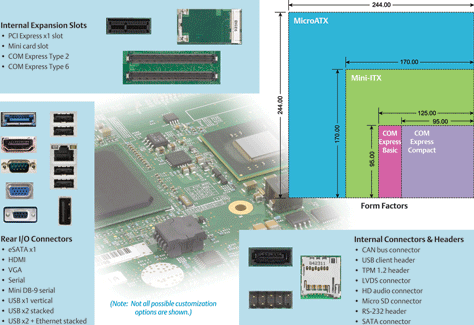
The healthy market for commercial off-the-shelf (COTS) embedded computer motherboards means that system designers have a wide range of choices with many different combinations of processor, memory and interface options available as standard products.
For many companies, the choice of COTS motherboards provides a ‘best fit’ that is good enough. It is, though, rarely a perfect fit. Certain classes of design requirement are not well served by these standard boards. These designs fall into four categories:
* Outliers: design projects with uncommon requirements. The specifications are in limited demand, so it is not economical for embedded board manufacturers to make a standard product to meet them.
* Long-lived platform products: it is difficult to maintain uniformity of board specifications over time and over multiple product variants when sourcing from board manufacturers’ COTS products, since the specifications of these COTS offerings change frequently to keep pace with changes in technology and customer demand.
* Volume products: customised designs can often yield lower product costs over the life of the product by precisely matching required features with market requirements.
* Differentiated products: choosing motherboard COTS designs that are also readily available to your competition inevitably leads to cost pressures and a greater challenge to add additional value in your design.
In these four cases, the use of standard boards from a catalogue is disadvantageous.
Unfortunately, the alternative – commissioning a unique, custom board – has in the past been commercially unattractive for many projects. Custom boards made to the user’s specification provide a perfect fit for the design requirement, but customisation services have been slow, inflexible, burdened with complex legal provisions and, above all, expensive. OEMs have learned to work around the potentially large number of design compromises that go along with accepting a COTS motherboard with a good enough fit.
To address the need for optimised board designs when a COTS board is not suitable, Emerson Network Power has introduced an innovative process called RapiDex, a rapid board customisation service that allows OEMs to specify processor, I/O, connector and other options within a standard or custom board form factor. The service is now available for boards using Intel embedded processors and other processors going forward.
The RapiDex service is fast and straightforward for the customer to use, requiring no special contracts, no statements of work and no project supervision. And unlike conventional customisation engagements, the customer need make no commitment on production volume numbers; the minimum first order quantity is only 100 units.
The RapiDex service is also attractively priced to offer a low-cost path to designing a differentiated product versus a COTS design that offers no competitive advantage: the customer pays a flat production setup fee, no non-recurring engineering (NRE) fees, and unit costs per board shipped are comparable to the price of a standard COTS embedded motherboard.
This new service is the result of innovative developments in design and manufacturing automation pioneered by Emerson Network Power, and it brings the advantages of board customisation to a far wider range of embedded OEMs than could previously benefit from it.
The RapiDex solution offers OEMs lower materials costs, a planar design that eliminates high-profile daughter cards, improved reliability through the use of SMT components to eliminate the vulnerable connectors to plug-in daughter cards and a simplified supply chain, with the complete solution being available from a single vendor.

Benefits for platform products
The RapiDex service is equally useful to OEMs manufacturing platform products with extended life cycles. The OEM defines the requirements for the platform, specifying common features (connectors, I/O, peripherals) and dropping in processor variants to a common board design. Under the RapiDex service, future upgrades to enhanced processors can be accommodated within the board design, with the ability to maintain uniformity of outline and profile across all future variants.
Technology developed by Emerson has enabled the RapiDex service to be automated at every point, eliminating the delay, cost and risk of error or inconsistency associated with human involvement in processes. Crucial to the implementation of this chain of processes is a modular implementation of board functions; the design rules developed by Emerson enable these functions to be integrated, using advanced design software, into tens of thousands of configurations of processors, I/Os, peripherals and connectors.
Using an embedded Intel (or other) processor, customers can specify a choice of I/O configurations, memory specifications and peripheral capabilities (such as wireless communications) in any rectangular form factor. After defining the board specification from a menu of options, the unit price quotation is delivered to the customer within two working days. From the date on which the customer places its order, RapiDex will produce first article boards (1-12 units) within four to eight weeks. Volume orders follow industry standard turnaround times, with forecasted orders fulfilled within eight weeks or less of order date.
Customers of the RapiDex service pay no NRE fees. A flat production setup fee plus unit costs pays for the first sample boards (1-12 units). In volume production, the customer simply pays the unit price as quoted at the start of the customer engagement.
For more information contact Kevin Jurrius, Arrow Altech Distribution, +27 (0)11 923 9600, [email protected], www.arrow.altech.co.za
| Tel: | +27 11 923 9600 |
| Email: | [email protected] |
| www: | www.altronarrow.com |
| Articles: | More information and articles about Altron Arrow |

© Technews Publishing (Pty) Ltd | All Rights Reserved